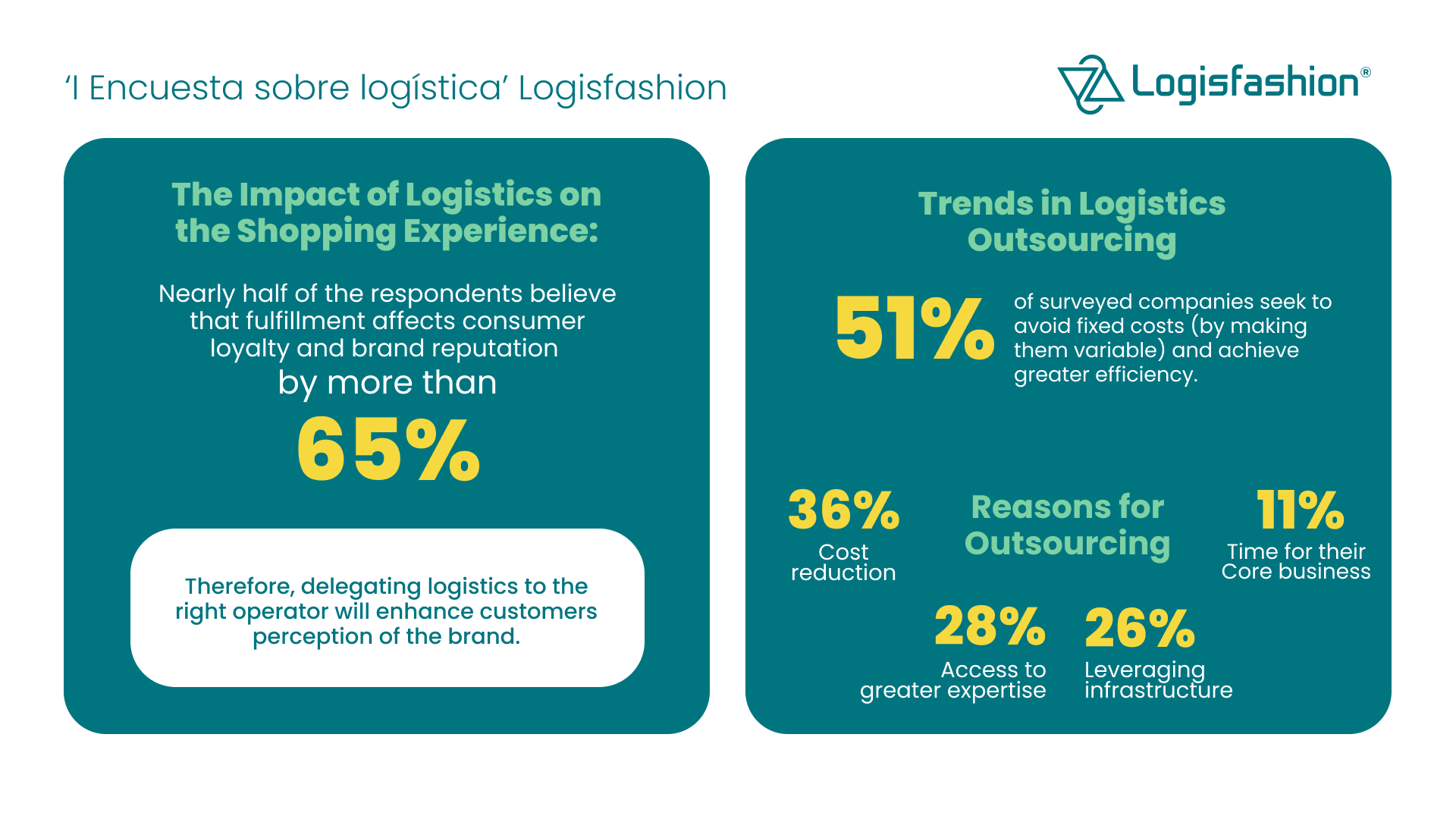Did you know that 51% of companies admit that the main reason behind why they decide to outsource their logistics’ fulfilment is to make costs variable and thus become more efficient. This is what can be ascertained from the ‘1st Logistics Survey’ that we have devised at Logisfashion to address the trends and problem areas within the logistics, eCommerce and retail sectors.
A study activated to bring to the fore the main issues faced by brands operating in sectors such as fashion, lifestyle, home furnishing or technology through channels involving both electronic commerce and physical stores, and their solution via efficient logistics processes that improve their productivity and thus their earnings.
In this regard, thanks to the survey, we have been able to ascertain the growing trend towards the outsourcing of this fulfilment, owing the swift upsurge in eCommerce and omnichannel sales points, which stress the significance of processes, namely capability and scalability during peak demand periods or special campaigns, in which greater efficiency and a swifter response are needed to offer the best possible service to consumers. Indeed, during these periods of the year, those surveyed underscored their concern with orders not arriving on time (47%), mistakes in orders dispatched (22%), HR management (19%) and technological glitches (12%). All factors that can be resolved through experience, efficiency and the best team available.
To be precise, the last mile is an essential factor in the delivery of eCommerce orders, above all during peak demand periods. For this reason, the main challenges that these brands must overcome in the final stretch of the logistics chain are delivery times (46%), price (24%), geographical coverage and order tracking (15%).
This is why the main aspects that lead companies to outsource their fulfillment and entrust their supply chains in the hands of a trustworthy logistics operator are stated as being the reduction in costs (36%), access to greater expertise and industry insight (28%), harnessing a consolidated infrastructure (26%) and having more time to focus on their main activities (11%). An operator that must adapt to their needs in terms of storage, preparation and distribution of order to the end customer, their own stores, large department stores, multi-brand stores and wholesale outlets in Spain and throughout the world, bearing in mind the operational aspects of each channel independently or wholly with single stock.
It must not be overlooked that fulfillment is closely linked to consumers’ shopping experience. Those surveyed in the study also bear witness to this: almost half are certain that the shopping experience their clients enjoy directly has a bearing on their loyalty and the brand’s reputation by more than 65%, which means that placing their logistics processes in the hands of a time-served operator will bolster the customers’ brand perception.
Beyond logistics… and our borders
International transport has become a fundamental piece of logistics and has a significant impact on prices, order delivery times etc. With this in mind, what those surveyed most value when outsourcing their management tasks is the ease with which the processes are performed (51%), technology (15%) and the platform that helps them to carry out order tracking (15%).
Indeed, many companies are concerned with not having on-hand complete visibility and tracking throughout the logistics process when they decide to embark upon new markets and need to be aware of customs regulations in the new destination. Due to this, the efficiency of operations must be increased while managing transport needs in a reliable and flexible manner.
Taking into consideration all of these factors, at Logisfashion we were eager to discover which are the main stumbling blocks that hinder companies’ internationalization: Finding a suitable space is paramount for 55% of those surveyed, followed then by logistical aspects (23%), regulations in force in the destination country (16%) and their taxation system (6%).
Broken down by regions, the most attractive in the eyes of those surveyed when broadening their businesses are Latin America (36%), Europe (27%), Asia (20%) followed by North America (18%).
Logistics supporting communities
According to the UN, the Sustainable Development Goals (SDG) could generate up to 12 billion dollars by the year 2030. For this reason, compliance with them enables more responsible entrepreneurial management, thus improving their standing while opening the doors to new customers and markets. Without overlooking that moving towards climate action entails a saving in terms of costs and natural resources, a backdrop that should accompany the financial and corporate policies of all companies.
In light of the foregoing, a space has also been set aside in the survey to ascertain which SDG are of greatest priority for eCommerce and retail companies, with gender equality having the most votes cast at 39%, followed by industry and innovation with 26%, responsible production and consumption at 23% and affordable and sustainable energy accounting for the remaining 13%.
They have also responded on where to place the spotlight in this regard within their own internal policies. 55% of them back a more respectful working ambience, 23% wish to see greater awareness in matters of harassment, 13% would like to breach the wage gap and 9% were concerned with gender quotas. To summarize, companies increasingly turn to specialist partners to streamline their fulfilment logistics processes in order to obtain direct economic gains alongside more efficient management of their supply chains. At Logisfashion, we shall continue to update this survey to unearth exactly which new challenges eCommerce and retail companies face, with the aim of being able to offer them standout solutions for their logistics.

